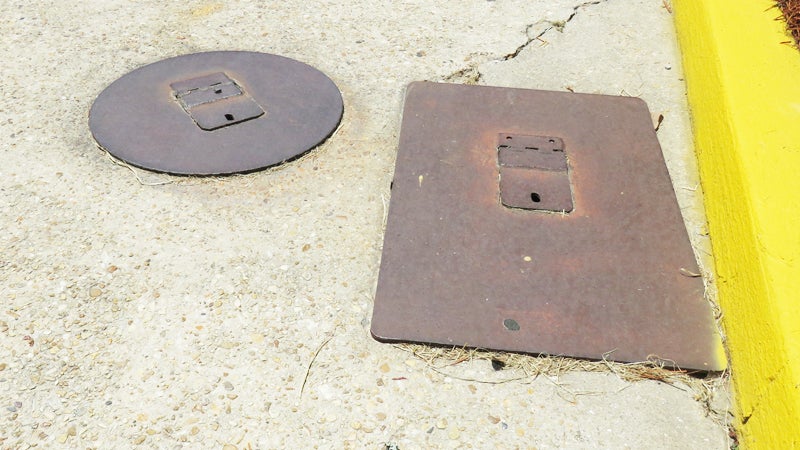St. John eyes May for water meter upgrade; administrators accepting bids this month for $6M project
Published 12:15 am Saturday, February 2, 2019

- Tops cover commercial water meters along Main Street in LaPlace.
LAPLACE — Relief from inflated water bills could come as early as August for some LaPlace residents, St. John officials said.
Installation of an Advanced Smart Metering system is now projected to begin in May 2019 and conclude in May 2020, according to Robert Figuero Jr., chief financial officer for St. John the Baptist Parish.
Figuero assumed responsibility for the project early this year, after Utilities Director Blake Fogleman resigned to pursue other opportunities. According to Figuero, all St. John residents can expect to have functioning meters by May 2020, though most should see relief sooner.
Meters will be turned on gradually with the completion of each of St. John Parish’s six billing cycle installations, starting with the largest cycle in LaPlace.
Earlier reports cited an April 2019 to April 2020 installation timeframe, though Figuero said the administration must account for an extra 30-plus days after bid approval to finalize paperwork with the Louisiana Department of Environmental Quality.
The St. John Parish Council approved an authorization to solicit bids last week. Advertisements for bids will run in L’OBSERVATEUR throughout February, and companies will be held to an early March deadline for submittal.
Figuero said the Parish Council would likely take the bids into consideration during the March 12 council meeting and vote to approve during the March 26 meeting.
Approval might not come so easily, however, as several Parish Council members expressed apprehension with the bidding process.
A vote to substitute a request for proposal (RFP) process showed a divided council, with four Council members voting in favor, four against and one absent.
Councilman Marvin Perrilloux left the room, coughing, just before the vote and returned minutes later after a trip to the restroom.
The vote did not pass without a majority, but a subsequent vote to return to the bid process was approved 5-4, with Larry Sorapuru Jr., Julia Remondet, Larry Snyder, Lennix Madere Jr. and Kurt Becnel in favor, and Perrilloux, Michael Wright, Jaclyn Hotard and Tom Malik against.
Figuero explained the distinction between bids and RFPs with a car-buying analogy: One could request bids for a 2019 Ford F150 with particular specs and choose the lowest price bid that comes in.
In an RFP scenario, the proposal might be for a truck of any make or model. It would be up to the buyer to select the best deal, regardless of whether it’s the lowest cost.
Perrilloux initially wanted to table the matter, but he feels comfortable with the bidding process as long as proper specifications rule out low quality companies.
“My concern was not RFP or bids,” Perrilloux said. “My concern was letting anyone bid on this project and ending up back where we are. We need to put a fail-safe program into this bid so we can weed out the fly-by-night engineers who might give us meters that don’t last five years. That was my concern because we don’t have $6 million to give away every 10 years on a project.”
Preventive maintenance and extended warranty are a must in any water meter contract, Perrilloux said, adding he’s speaking to a project engineer to ensure those factors are not overlooked.
Councilman Michael Wright shared a preference to view the company’s past experience, references and history to negotiate pricing.
“In the bidding process, we are held to the lowest price,” Wright said. “Historically, we have had issues with items coming with bids where the lower price isn’t always the best.”
Figuero said bids have been the plan since the initial pre-project meeting in August, noting it is the process LDEQ is most accustomed to.
LDEQ provided the $6 million loan, which will pay for meter infrastructure, installation, training and three years of maintenance, according to Figuero.
Residents may remember a $16 million figure discussed by the Parish Council last year, representing the cost estimation over the 20-year life of the meter, including maintenance costs.
Figuero said costs over the next 20 years would be met using standard fees from the water system.
“The system is supposed to pay for those fees and maintain itself,” Figuero said.




